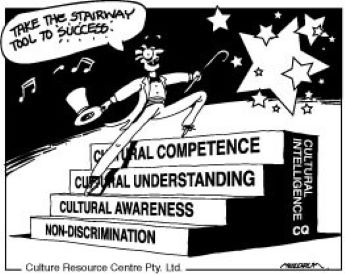Blog Culture@Work
Welcome! My name is Joost Thissen and here I like to share cultural columns and insights for those of us who are interested in culturally diverse and global workplaces.


Welcome! My name is Joost Thissen and here I like to share cultural columns and insights for those of us who are interested in culturally diverse and global workplaces.


cultural column  Email This Post
Email This Post
Learning and Development (L&D) professionals in organisations can help drive an organisation’s global talent by offering new recruits the opportunity to develop the cultural capabilities to achieve a high level of Cultural Intelligence (CQ). CQ is defined as an individual’s capability to gather information, interpret, understand, develop, and adapt effectively in culturally diverse situations (Earley and Soon, 2003). L&D professionals therefore play a crucial role in mapping the new recruits’ formal education with development plans that address how to preparing your global talent for your future lobal business success.
Australian organisations are very much part of the global business environment, with China, Japan and Southeast Asia being large trading partners. With Australian organisations offshoring, outsourcing, and partnering with vendors from these counties or regions, L&D professional are required to investigate what abilities should be in a global talent development plan.
New recruits -or professionals in general for that matter- are often offered country cultural specific information, and online ‘do’s and don’ts’ business briefings to prepare them for working with certain countries or regions. This might however bring the unwanted consequence that people accentuate bias and use stereotypes to describe cultural groups without considering the individual. CQ however, takes into account cultural general information that includes the underlying drivers to cultural behaviour, and focuses on developing a much broader adaptability to cultural differences.
Some scenarios to consider:
The above scenarios all play out on distinct levels of cultural ability: dos and don’ts in naming conventions, lack of knowledge of the impact of Malaysian culture on behaviour, and lack of skills to interpret the Japanese decision-making processes. They have in common the use of bias and stereotyping, and that they definitely do not make for successful global interactions.
Matthew Szulik, Former Chairman, Red Hat Inc, once commented “Workers are really struggling to compete in a globally competent workforce”. According to Szulik, workers from higher educational environments seem to run into difficulties in a number of areas:
The difficulties people experience in these areas could readily be overcome when we prepare our professionals by providing them with appropriate training and coaching. From the literature we know that EQ overtook IQ in its importance for business success in the eighties, and since early 2000s, EQ combined with CQ seems to drive the emotional and cultural abilities required to reach global business success.
Cultural abilities to work successfully in a culturally diverse and global setting.
From an intercultural perspective, professionals require the cultural abilities to collaborate and communicate with culturally diverse people, and to be flexible in working in (virtual) culturally diverse teams to achieve results (Covers areas 1 and 3). They should have the ability to map and align culturally diverse work practices to comprehend the global implications of their actions (Covers area 4). Adapting to change (2), working at fast pace (5), sense of innovation (6), and life long learning (7) seem abilities that fit both EQ and CQ.
Looking for globally sophisticated and flexible talented professionals.
The seven required abilities do provide directions to a need for ‘globally sophisticated and flexible professionals’. We could start by incorporating the list as basic selection criteria that guide the way organisation’s select and recruit new recruits. In fact, organisations whose businesses becoming more global seem to recruit their future global talent more and more straight out of university due to the ongoing war for talent (Khanna, 2021).
When recruiting people for global business, it might be wise to consider a number of relevant selection criteria for example people i. who demonstrate to have a growth mindset, ii. who embrace the importance of ongoing learning, and iii. who have shown a tangible interest in dealing with people from different cultural backgrounds (via formal education in e.g. cross-cultural management). Cultural abilities, however, cannot be learned during university lectures alone, they need to be further developed via training and coaching, and need to be practiced over time to develop high levels of CQ. When we deconstruct CQ, we find four equally relevant facets (Earley and Soon, 2003):
The level of CQ indicates how able a person is in balancing these four different capabilities.
The stairway
The stairway to CQ People, teams and organisations assist in finetuning the different steps to develop the four CQ facets. We analyse the frequency, intensity and complexity of the intercultural interactions to get more in-depth knowledge of the specific needs and requirements for training and coaching.
The stair steps
We differentiate three consecutive stair steps to reach CQ: cultural awareness, cultural understanding, and cultural competence. Each stair step relates to a certain level of CQ. With help of the Stairway CQ Tool, L&D is able to select the appropriate intercultural training or coaching programs for professionals.
The interventions
Each intercultural training or coaching program uses a range of interventions to achieve the learning goals, e.g., needs analysis, mapping tools, cultural (self) assessments, intercultural competence profiling, communicator profilers, cultural behavioural strategies, simulations, experiments, assimilators, case studies, tools to re-align practices, reflective action planning. These interventions all assist in the development of your global talent to assist your global business success.
Retaining your Global Talent
One can only hope that organisations move beyond offering country briefings and ‘do’s and don’ts’ business practices and add learning about underlying drivers to cultural behaviour and developing adaptability to cultural differences to enhance the CQ.
Offering ongoing targeted intercultural learning and development programs to global talent enhances successful international deployments and thus retaining your global talent. This might in fact provide your organisation with a cultural competitive advantage in the war for global talent.
_____________________________
Joost Thissen, Partner & Interculturalist
joost@cultureresourcecentre.com.au
cultural column  Email This Post
Email This Post